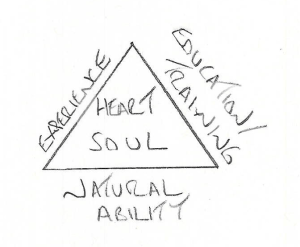Your past is not your potential. In any hour you can choose to liberate the future.
Marilyn Fergusen
Leadership matters! Most people at least implicitly understand this concept and people that have studied and practiced leadership understand this concept at a deeper level. As an example, General Stanley McChrystal’s main takeaway from 34 years of service in the United States Army as a commander and leader, as he describes in his book, “My Share of the Task” is that leadership matters. Developing and selecting individuals for positions of authority is therefore one of the most important tasks that leaders are responsible for.
Most organizations rate individuals based on their job performance using established criteria. Most organizations also espouse that promotions are based on future potential. How organizations make the transition from performance based evaluations to a potential based promotion system is critical. Also important to consider is that tactical prowess (performance) does not necessarily equal operational or strategic level thinking and communication skills (future potential). Individuals and institutions often tend to erroneously and automatically equate the two.
Performance Potential Framework
A useful framework to understand each other as human beings is included below. We are all a combination of our experiences, education and training, and natural ability, informed and driven by our heart and soul.

Using this framework, when we conflate performance and potential, individuals are often promoted that are not ready or able to operate at the next higher level. These individuals often rely too much on their previous experiences and may not have the talent, education, or training required at higher levels. Additionally, their heart and soul may not be in the right place, especially when faced with Colonel John Boyd’s classic, “To Be or To Do” quandary. In extreme cases, the Peter Principle may apply, resulting in an individual that is promoted well past their potential, sometimes with catastrophic results.
Indicators of Future Potential
There are many indicators of future potential; four of the most important are briefly described below. These are important to consider as we develop and seek talent to progress in our organizations.
Cognitive Ability:
-
Thinking two levels up and two levels down – There is truth to the “Where you sit is where you stand” platitude and those that are able to understand different perspectives and the bigger picture, as well as possess the ability to make decisions and act on that type of thinking, may have future potential.
-
Complex thinking – An individual that is able to think in a complex, non-linear, agile, and disciplined manner as well as practice meta-cognition, the ability to think about and change one’s own thinking while learning.
Maturity
-
The ability to be steady and show only positive emotion. Negative emotion is one of the most significant detractors in organizations and in leaders. Attitudes and moods are contagious, none more so than those of a commander or leader. Commanders and leaders have lost the right to have a bad day.
Leadership Bias
-
Those that clearly “get it” and evaluate everything through a leadership lens, as John Maxwell describes in “The 21 Irrefutable Laws of Leadership”, leadership is their bias and they have the ability to read people, situations, trends, resources, and themselves, anticipate, see and fill gaps, and prepare and respond to different scenarios.
9-Level Communication Skills
-
Those that can communicate well, masterful in their ability to understand the content and condition of a conversation as described by Patterson, Grenny, McMillan, and Switzler in their book, “Crucial Conversations”. They are able to meet the objective of the dialogue and maintain/develop relationships.
“the question is not performance or potential, its performance and potential!”
In short, leaders should be informed by their experiences, education, and training, but not defined by them. If an individual allows this to happen, at least implicitly, they will be held hostage by the past and even though may have performed well, they may not have enough potential to project them to positions of more authority and responsibility. People that understand the context of the past and the present, while seeking to understand the possibilities of the future are the individuals that may deserve to be promoted in an organization. Referring back to this article’s title, the question is not performance or potential, its performance and potential!
